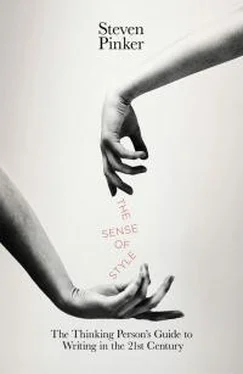Multiply these daily frustrations by a few billion, and you begin to see that the curse of knowledge is a pervasive drag on the strivings of humanity, on a par with corruption, disease, and entropy. Cadres of expensive professionals—lawyers, accountants, computer gurus, help-line responders—drain vast sums of money from the economy to clarify poorly drafted text. There’s an old saying that for the want of a nail the battle was lost, and the same is true for the want of an adjective: the Charge of the Light Brigade during the Crimean War is only the most famous example of a military disaster caused by vague orders. The nuclear meltdown at Three Mile Island in 1979 has been attributed to poor wording (operators misinterpreted the label on a warning light), as has the deadliest plane crash in history, in which the pilot of a 747 at Tenerife Airport radioed he was at takeoff, by which he meant “taking off,” but an air traffic controller interpreted it as “at the takeoff position” and failed to stop him before he plowed his plane into another 747 on the runway. 14The visually confusing “butterfly ballot” given to Palm Beach voters in the 2000 American presidential election led many supporters of Al Gore to vote for the wrong candidate, which may have swung the election to George W. Bush, changing the course of history.
How can we lift the curse of knowledge? The traditional advice—always remember the reader over your shoulder—is not as effective as you might think. 15The problem is that just trying harder to put yourself in someone else’s shoes doesn’t make you a whole lot more accurate in figuring out what that person knows. 16When you’ve learned something so well that you forget that other people may not know it, you also forget to check whether they know it. Several studies have shown that people are not easily disabused of their curse of knowledge, even when they are told to keep the reader in mind, to remember what it was like to learn something, or to ignore what they know. 17
But imagining the reader over your shoulder is a start. Occasionally people do learn to discount their knowledge when they are shown how it biases their judgments, and if you’ve read to this point, perhaps you will be receptive to the warning. 18So for what it’s worth: Hey, I’m talking to you . Your readers know a lot less about your subject than you think they do, and unless you keep track of what you know that they don’t, you are guaranteed to confuse them.
A better way to exorcise the curse of knowledge is to be aware of specific pitfalls that it sets in your path. There’s one that everyone is at least vaguely aware of: the use of jargon, abbreviations, and technical vocabulary. Every human pastime—music, cooking, sports, art, theoretical physics—develops an argot to spare its enthusiasts from having to say or type a long-winded description every time they refer to a familiar concept in each other’s company. The problem is that as we become proficient at our job or hobby we come to use these catchwords so often that they flow out of our fingers automatically, and we forget that our readers may not be members of the clubhouse in which we learned them.
Obviously writers cannot avoid abbreviations and technical terms altogether. Shorthand terms are unobjectionable, indeed indispensable, when a term has become entrenched in the community one is writing for. Biologists needn’t define transcription factor or spell out mRNA every time they refer to those things, and many technical terms become so common and are so useful that they eventually cross over into everyday parlance, like cloning, gene, and DNA . But the curse of knowledge ensures that most writers will overestimate how standard a term has become and how wide the community is that has learned it.
A surprising amount of jargon can simply be banished and no one will be the worse for it. A scientist who replaces murine model with rats and mice will use up no more space on the page and be no less scientific. Philosophers are every bit as rigorous when they put away Latin expressions like ceteris paribus, inter alia , and simpliciter and write in English instead: other things being equal, among other things, and in and of itself . And though nonlawyers might assume that the language of contracts, such as the party of the first part, must serve some legal purpose, most of it is superfluous. As Adam Freedman points out in his book on legalese, “What distinguishes legal boilerplate is its combination of archaic terminology and frenzied verbosity, as though it were written by a medieval scribe on crack.” 19
Abbreviations are tempting to thoughtless writers because they can save a few keystrokes every time they have to use the term. The writers forget that the few seconds they add to their own lives come at the cost of many minutes stolen from the lives of their readers. I stare at a table of numbers whose columns are labeled DA DN SA SN, and have to flip back and scan for the explanation: Dissimilar Affirmative, Dissimilar Negative, Similar Affirmative, Similar Negative. Each abbreviation is surrounded by many inches of white space. What possible reason could there have been for the author not to spell them out? Abbreviations that are coined for a single piece of writing are best avoided altogether, to spare the reader from having to engage in the famously tedious memory task called paired-associate learning, in which psychologists force their participants to memorize arbitrary pairs of text like DAXQOV. Even moderately common abbreviations should be spelled out on first use. As Strunk and White point out, “Not everyone knows that SALT means Strategic Arms Limitation Talks, and even if everyone did, there are babies being born every minute who will someday encounter the name for the first time. They deserve to see the words, not simply the initials.” 20The hazard is not limited to professional prose. Some of us receive annual Christmas letters in which the household spokesperson cheerily writes, “Irwin and I had a great time at the IHRP after dispatching the children to the UNER, and we all continue work on our ECPs at the SFBS.”
A considerate writer will also cultivate the habit of adding a few words of explanation to common technical terms, as in “ Arabidopsis, a flowering mustard plant,” rather than the bare “ Arabidopsis ” (which I’ve seen in many science articles). It’s not just an act of magnanimity: a writer who explains technical terms can multiply her readership a thousandfold at the cost of a handful of characters, the literary equivalent of picking up hundred-dollar bills on the sidewalk. Readers will also thank a writer for the copious use of for example, as in, and such as, because an explanation without an example is little better than no explanation at all. For example: Here’s an explanation of the rhetorical term syllepsis: “the use of a word that relates to, qualifies, or governs two or more other words but has a different meaning in relation to each.” Got that? Now let’s say I continue with “… such as when Benjamin Franklin said, ‘We must all hang together, or assuredly we shall all hang separately.’” Clearer, no? No? Sometimes two examples are better than one, because they allow the reader to triangulate on which aspect of the example is relevant to the definition. What if I add “… or when Groucho Marx said, ‘You can leave in a taxi, and if you can’t get a taxi, you can leave in a huff’”? 21
And when technical terms are unavoidable, why not choose ones that are easy for readers to understand and remember? Ironically, the field of linguistics is among the worst offenders, with dozens of mystifying technical terms: themes that have nothing to do with themes; PRO and pro, which are pronounced the same way but refer to different things; stage-level and individual-level predicates, which are just unintuitive ways of saying “temporary” and “permanent”; and Principles A, B, and C, which could just as easily have been called the Reflexive Principle, the Pronoun Principle, and the Noun Principle. For a long time I got a headache reading papers in semantics that analyzed the two meanings of some . In a loose, conversational sense, some implies “some, but not all”: when I say Some men are chauvinists, it’s natural to interpret me as implying that others are not. But in a strict, logical sense, some means “at least one” and does not rule out “all”; there’s no contradiction in saying Some men are chauvinists; indeed, all of them are . Many linguists refer to the two meanings as the “upper-bounded” and “lower-bounded” senses, labels borrowed from mathematics, and I could never keep them straight. At last I came across a limpid semanticist who referred to them as the “only” and “at-least” senses, labels from everyday English, and I’ve followed the literature ever since.
Читать дальше












